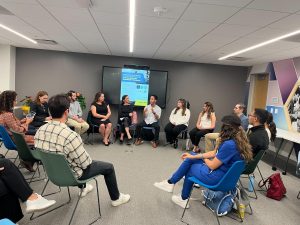The first-ever roundtable discussion focused on Latino health at Georgetown University in honor of Hispanic Heritage Month emphasized mental health and substance use disorder Oct. 10. The roundtable brought together Latino leaders from across all of Georgetown’s campuses to discuss critical health issues facing the Latino community, specifically the overdose epidemic, mental health and broader health disparities.
La Casa Latina, a space for community building for Latino students at Georgetown University; the Center for Multicultural Equity and Access, which supports marginalized students; Georgetown’s master’s in addiction policy and practice program, a new program that trains students in addiction policy and advocacy; Latino Medical Students Association (LMSA), an organization meant to bring together Latinos in medical school; and La Nueva Drug Talk, a movement to start conversations about substance use disorder among young people, all co-hosted the event.

(Madeline Grabow)
Gina Malagold (GRD ’22), the director of multicultural affairs for Song for Charlie, a nonprofit charity dedicated to raising awareness about counterfeit pills, moderated the roundtable. She opened the panel by sharing important statistics surrounding drug overdose and mental health within the Latino community.
Malagold said that these statistics display the significant impact of the epidemic on the Latino community.
“When we think of drug use and the drug overdose epidemic, which is sweeping our country — according to the CDC, since 2020, killing more than 100,000 people a year — we have to understand that the Latino community is being disproportionately impacted,” Malagold said at the event. “We’re seeing a 617% increase in overdose deaths involving synthetic opioids impacting the Latino community.”
Song for Charlie created La Nueva Drug Talk to identify the gaps in mental health care facing the Latino community by engaging young professionals in listening sessions across different universities.
Malagold explained that reaching young people is important, saying they are the ones who are directly serving the community.
“We want to reach students because we think those are the best messengers for this information because they are the ones who are going to be serving the community,” Malagold said. “I know there are Latino brothers and sisters struggling right now and we can work together to prevent tragic outcomes.”
Despite the rates of substance abuse among Hispanics in the United States being relatively close to the rates of the general U.S. population, the Substance Abuse and Mental Health Services Administration (SAMHSA), an agency within the Department of Health and Human Services that works to expand substance abuse and mental health treatment services, reported that, in 2023, 97.1% of Hispanic adults who had a substance use disorder in the past year and had not received treatment did not perceive that they needed substance use treatment.
Maria Jose Salamanca (MED ’27), co-president of LMSA and panel attendee, said the event was important to her because drug overdose is something that isn’t discussed in the Latino community due to its stigmatization.
“I was very surprised to learn how much of a growing issue it is here in the United States. I think it gives the issues a platform to talk about and a space,” Salamanca told The Hoya. “I think it’s also very important that we were able to connect with all the different colleges that Georgetown is a part of and just integrate the conversation, not just from the medical side.”
Benjamin Fraifeld (GRD ’22), associate director for policy and advocacy at Maryland’s Office of Overdose Response, also spoke at the roundtable. He is a graduate of Georgetown’s master’s in addiction policy and practice program and now works on reducing overdose mortality in Maryland.
Fraifeld said stigma surrounding drug addiction and overdoses plays an important role in policymaking.
“The stigma that exists in our households, our friends’ and families’ households, anywhere across the country, ends up being baked into policy,” Fraifeld said at the event. “And so that might look like a state that has robust good samaritan protections for somebody who seeks medical health for somebody having an overdose. But what if that doesn’t protect you based on your immigration status?”
Fraifeld’s remarks contributed to the larger discussion at the roundtable about how substance use disorder should be thought of as a public health crisis rather than a criminal justice issue. According to the National Institute on Drug Abuse, drug treatment can reduce the rate of substance use disorder by between 40% and 60%.
Fraifeld added that immigration status is a stigmatizing factor involved in drug abuse help.
“Substance use is an interesting condition in that it is one of the only — or the only — medical condition that is also criminalized,” Fraifeld said. “Whether we want it to be or not, it still is.”



















